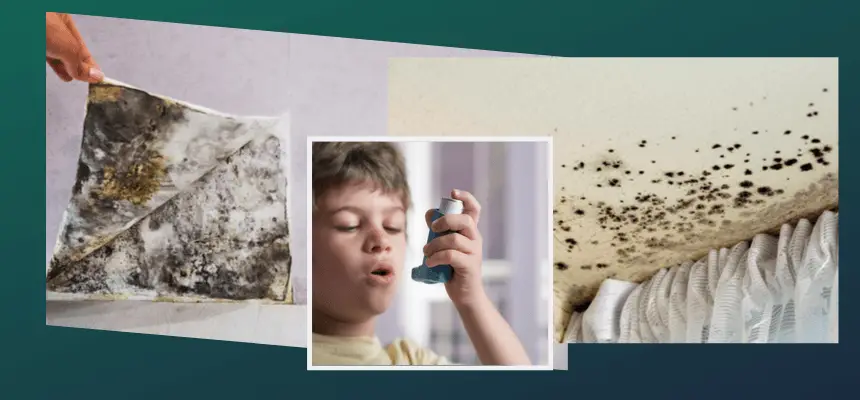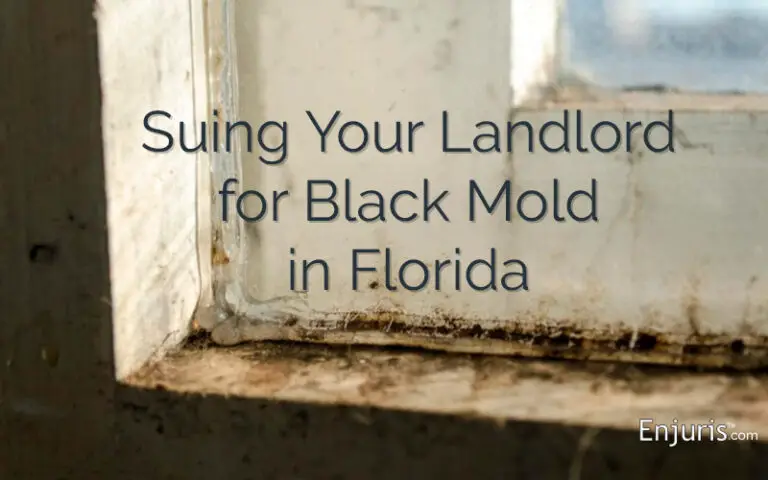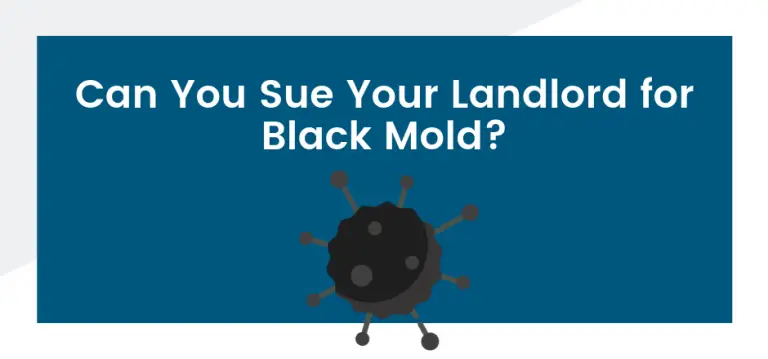Landlords Responsibility And Liability For Mold
Laws related to mold and mold damage vary from state to state. Depending on the law where you live, landlords might have to disclose suspected mold to new or potential tenants and clean up existing mold.
Landlords must provide livable rentals under the implied warranty of habitability.
In almost every state, landlords must provide livable rentals under the implied warranty of habitability. In general, the warranty of habitability requires landlords to maintain both the rental and the property as a whole so that living conditions are safe and secure.
Under this warranty , a landlord who fails to prevent or clean up mold might be liable for any health problems you suffer as a result.
We Will Litigate Your Black Mold Lawsuit
Yes, you can sue your landlord for mold issues. Whether youve just noticed mold, you or members of your family have developed symptoms of mold infection, or your household goods or personal property were damaged by mold, give us a call to schedule your free, no-obligation consultation.
We know how to win a mold case, and weve gotten our clients black mold lawsuit settlements and judgments. Our toxic mold lawyers will evaluate your case at no cost to you and help you file a lawsuit to recover monetary damages as well as make sure your rental property is a safe place to live for you and your family.
+++++ Disclaimer+++++ This blog is considered advertising and does not constitute any client-attorney privilege and does not offer any advice or opinion on any legal matter. This blog was drafted by Digital Mixology a digital marketing, Public Relations, advertising, and content marketing firm located in Philadelphia, PA.
Saffren & Weinberg
What Do I Do If I Find Black Mold In My Rental House
Notify your landlord immediately. Take pictures of the affected area if it is visible, or if you see there is a water leak but do not see the mold itself, take photographs of that. If you are experiencing any symptoms of mold infection, see a doctor right away and get a diagnosis. In severe cases, you may have to vacate the property to preserve your good health.
You May Like: Cleaning Mildew From Bathroom Ceiling
What Can I Do As A Tenant
Renters can address some minor moisture problems themselves.
- Always use bathroom fans during and after bathing/showering
- Clean up spills and leaks quicklyâespecially on carpets.
- Use kitchen fans when cooking to reduce humidity.
- Dont run showers or boil water to humidify your home.
- Avoid using humidifiers unless there is a medical reason to use one.
- Ensure good air movement in your home to help prevent condensation:
- Open windows when possible,
- Don’t block supply and return registers with furniture
- Keep a few inches of space between furniture and walls
Tenants should promptly notify their landlord when they find a moisture problemor indoor mold growth. Common moisture problems such as pipe leaks, roof leaks, sewage back-ups and overflowing toilets/sinks/bathtubs can become mold problems if they are not address quickly. For ongoing problems, notification should be in writing to help avoid misunderstandings. Request that repairs be completed within 14 days. Tenants should keep copies of letters. If there is mold growing indoors, the moisture problem needs to be corrected and the mold removed. Simply painting over the problem is not going to solve the issue. Growth on surfaces, such as concrete, metal, tile, and solid wood, can be cleaned with water and a household cleaner, if the building material is structurally sound. Porous materials with mold growth, such as dry wall, carpet, upholstery, and insulation, are difficult to clean and should be thrown away.
Is Mould A Landlords Responsibility

As a landlord, its both your legal responsibility and a duty of care to your tenants to make sure your property is free of damp and mould. And because damp and mould can wipe thousands off a propertys value, tackling the problem at the earliest stage will help ensure your investment isnt adversely affected.
You May Like: Removing Mould From Bathroom Ceiling
Discovered Mold In Your Rented House Consider Talking With An Attorney Today
While it may seem harmless at the beginning, mold exposure can cause severe and lasting health complications. If you have suffered injuries that you believe are a result of mold exposure, you may want to sue your landlord for damages. Find a mold attorney in your area to learn more about your options.
Mold Lawsuit Settlement And Examples
The mold lawsuit settlement examples below will give you a general idea of what to expect: Broward County Courthouse, Florida — Former Florida prosecutor Stefanie Krathen Ginnis, who claimed that mold exposure at the Broward County Courthouse caused severe sinus problems, received a $166,500 settlement from the county (19 current and former county employees have filed â¦
Don’t Miss: How To Clean Mould On Ceiling
What Are My Options If The Owner Refuses To Help
First, it is important to check the lease agreement between the tenant and the landlord. Leases seldom address mold or moisture specifically, but they should include language specifying how maintenance and repair concerns are handled.
If a landlord fails to make repairs, the Attorney Generals publication Landlords and Tenants: Rights and Responsibilities suggests a number of remedies, including filing a complaint with the local housing, health, or building inspector, if there is one. Tenants can contact their city or county to see what codes and inspection services may be available.
The availability of inspectors and local codes varies throughout the state. Some cities have adopted property maintenance or rental housing codes. Another option may be the local health department. Some local health departments may apply their authority under Minnesota Law to declare a property a public health nuisance and may issue correction orders to the landlord. The Minnesota Department of Health does not provide direct services, such as inspections or testing, for mold problems.
If the city or county are unable to help, you may be able to take legal action, including a rent escrow action. The tenant should try to document the problem, where applicable, with letters, photographs, evidence of health problems, orders from local inspectors, and any other documentation that would help the case. More information on legal rights and action is available from these sources:
Toxic Mold Exposure And The Law
Most states do not have mold-specific laws on the books. Nonetheless, the statutes that govern premises liability and personal injury liability remain the standard by which such cases are judged. That means the role of negligence governs the question of liability.
In order for an individual to be guilty of negligence in a premises liability lawsuit, that person must be aware that the problem exists or should have been aware that the problem existed. In other words, negligence can be inferred circumstantially in some cases. When the issue is toxic mold exposure, its not incredibly difficult for landlords to be held liable for having allowed a toxic environment to fester.
For instance, a landlord should conduct a thorough inspection of the premises before a new tenant moves in. If a tenant moves in and begins to display signs of CIRS, they have every right to recover damages from the landlord.In states that do have mold-specific laws on the books, the burden is redoubled on the landlord to ensure that the environment is safe for their tenants. That could mean forcing the landlord to conduct timely inspections to make negligence even easier to prove.
Also Check: Getting Mildew Off Leather
How To Sue Your Landlord With Donotpay
It may seem simple in theory but, in practice, suing your landlord by yourself can be complicated. There are bureaucracies involved and so much paperwork for you to fill out. This is where DoNotPay can help. We are the worlds first robot lawyer and we have helped users sue corporate giants such as United Airlines! All you have to do is access DoNotPay from any web browser. From there, we will help you to:
Reasons You Can Sue Your Landlord
State specific laws will again come into play. In general, you may be able to file a lawsuit against your landlord for the following reasons.
Also Check: How To Get Rid Of Mold In The Bathroom Ceiling
Take Action If You Have Been Exposed To Toxic Mold In Sacramento Or El Dorado Hills
If you have become ill due to toxic mold exposure in a rental or a property you own, or have experienced damage to your personal property , talking to a Sacramento toxic mold lawyer about possible solutions can be critical to your future.
- $275 ThousandSingle Car Roll Over
- $250 ThousandNegligence.
- $250 ThousandConstruction defect with mold.
- $250 ThousandContractor negligence.
- $244 ThousandSideswipe automobile accident.
- $200 ThousandRear end automobile collision
- $200 ThousandDefective product.
- $125 ThousandFall down stairs.
- $125 ThousandRear-end automobile collision.
- $100 ThousandPedestrian vs. motor vehicle.
- $100 ThousandRear end automobile accident.
- $100 ThousandMotor vehicle t-bone.
- $100 ThousandBicycle Accident
Why Should You Choose Us?
- Available 24/7
- No Fees or Costs Unless We Win
- Over 30 Years of Experience
Rave Reviews fromHappy Clients
What If The Tenant Was The Cause Of The Mold Problem

In general, a landlord is not usually responsible for repairing mold damage if a tenant or a guest of the tenantâs caused the mold problem. The same holds true when a tenant or someone the tenant knows causes water damage to a property. However, if the tenant did not cause the mold problem, then there are several Texas renters rights regarding mold, such as:
- A Texas tenant has a right to end their lease and move out if a landlord refuses to remove the mold
- They may file a lawsuit against the landlord in a Texas court
- They can hire a contractor to remove the mold and deduct the cost of removal from their rent
- They may obtain a court order to require the landlord to remove the mold and/or
- Various other remedies depending on the terms of their rental agreement.
Also Check: How To Fix Mold On Bathroom Ceiling
How To Sue Your Landlord For Black Mold
Filing a personal injury lawsuit against your landlord should never be your first course of action. Test the air and determine the problem first. Perhaps its a harmless genus of mold and causing no health concerns.
Lets say that your landlord resists you every step of the way. They dont pay for testing or mold remediation, leading you to pay for it yourself. They dont rip out walls or replace damaged insulation. You havent had health problems yet, but you might down the road. What should you do?
This is when you should consider suing.
Theres no reason, legally or ethically, why a tenant should foot the bill for mold remediation. Depending on how much you have in damages and property loss, theres the possibility of resolution in small claims court. Many states have a limit of $10,000 for the amount in question, though each state has different thresholds. You would most likely represent yourself in this scenario. If your damages are due to be more than $10,000, you should work with an attorney.
Going to small claims court is essentially a mini-trial. After writing a demand payment letter to your landlord, you should prepare evidence related to losses and damages, present your case and collect damages.
Damages can include items like:
- Property loss
- Money spent on fixing property and remediation of mold
- Lost wages as a result of illness
- Medical expenses caused by mold exposure
- Loss of earning capacity
- Pain and suffering
Can Mold Make You Mentally Ill
People who suffer from toxic-mold based illnesses may endure depression, anxiety, lack of focus, and brain fog, with some reporting insomnia. These cognitive and psychiatric symptoms may be present with or without the physical symptoms of mold exposure which can include difficulty breathing, fatigue, and headache.
Also Check: How To Clean Mold From Basement Walls
Mold Clauses In Leases
Some landlords include clauses in the lease that purport to relieve them from any liability resulting from mold growth. At least one court has refused to enforce such a clause, ruling that to do so would be against public policy. More cases from other parts of the country are sure to arise as mold litigation makes its way through the courts. Some states require landlords to disclose information about mold to tenants.
A smart landlord will try to prevent the conditions that lead to the growth of moldand tenants should be the landlord’s partner in this effort. This approach requires maintaining the structural integrity of the property , which is the landlord’s job. You can help by preventing mold problems in your home in the first place and promptly reporting problems that need the landlord’s attention.
What Can Mold Do To Your Brain
Inflammation: Mold spores act as irritants, which can trigger the body to mount an immune response. This can lead to inflammation throughout the body. Inflammation in the brain can impair cognitive function, and in the case of chronic inflammation, this can lead to long-lasting cognitive impairment.
Recommended Reading: How To Remove Mold Stains From Canvas
Does A Landlord Have To Remove Mold From A Rental Property In Texas
The law says that landlords in Texas have a duty to remove conditions that materially affect the physical health or safety of an ordinary tenant if all of the following are true:
- The condition was not caused by the tenant , the tenants family, or the tenant’s guests and
- The landlord has proper written notice of the condition and
- The tenant is not delinquent in rent at the time of giving the landlord notice to repair or remedy.
Read the law here: Tex. Prop. Code § 92.056.
How To Break Up Penile Adhesions
Glanular adhesions are benign and when left alone tend to resolve on their own. To help the adhesions separate more quickly, we may suggest applying Vaseline® directly to the adhesions. The Vaseline will soften the adhesions, and with spontaneous erections, the adhesions will begin to break apart on their own.
Read Also: Cleaning Mildew Off Ceiling
Reach Out To Your Landlord
The first thing to do when a problem arises is to communicate with your landlord. If you are still living in the unit, you have an ongoing relationship with your landlord and maintaining that relationship is important.
If your landlord has not returned your security deposit, you will want to reach out to them and ask them why.
- Most of the time your landlord will agree to return your full security deposit . Note, a few days delay in returning your security deposit is usually not enough to be considered âbad faithâ under California Code of Civil Procedure Section 1950.5.
- If your landlord tells you they have deducted money from your security deposit, remind them that they have to provide you with an itemized statement of the deductions within 21 daysCalifornia Code of Civil Procedure Section 1950.5. Review the itemized statement and if anything stands out to you, ask them about it!
- Remember, if something is normal wear and tear, your landlord cannot deduct it from your security deposit.California Code of Civil Procedure Section 1950.5. It can be hard to determine what is considered normal wear and tear.
If your landlord doesnât agree to return your security deposit, then it might be time to escalate the situation.
Insurance Coverage For Mold Damage

If your possessions have been ruined by mold and must be replaced, contact your renters’ insurance agent immediately. Your renters’ insurance might cover the cost of replacement or damage repairdepending on what type of coverage you have and the cause of the mold problem. Do not expect your renters’ insurance policy to cover the costs of medical bills, howeveryou’ll need to turn to your own health insurance for that .
If you do not have renters insurance, or it does not cover your particular mold-related loss, you will need to sue your landlord as discussed above.
Don’t Miss: Mould On Bathroom Ceiling
Can Tenant Sue Landlord For Mold In Michigan
Can tenant sue landlord for mold in michigan? Michigan law allows landlords to do this, provided they give the tenant a written explanation of the mold damage costs within 30 days of the tenants lease termination.
Does Michigan have mold laws? The State of Michigan does not have laws that require anyone to cleanup, remove, or report mold in any type of indoor environment. The State of Michigan does not have a program to address issues related to mold, other than to provide people basic information about mold clean-up.
How Can I sue my landlord for mold exposure? In what has been deemed the largest personal injury verdict in a toxic mold-related lawsuit in the U.S., a Sacramento, Calif., jury awarded Darren and Marcie Mazza and their eight-year-old son, Bryce, $2.7 million on Nov. 8.
How much is a mold lawsuit worth? Yes, you can sue your landlord for mold issues. Whether youve just noticed mold, you or members of your family have developed symptoms of mold infection, or your household goods or personal property were damaged by mold, give us a call to schedule your free, no-obligation consultation.
